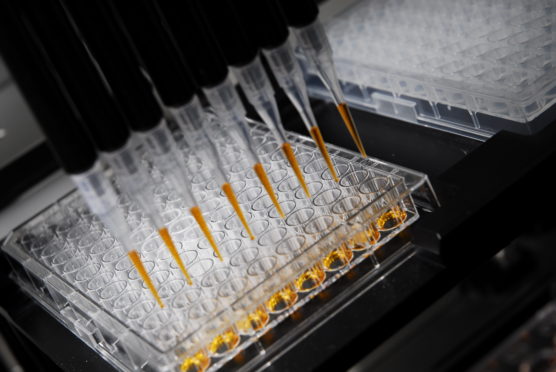Scientists at Dundee University have agreed a multi-million pound partnership with a drugs company to create a possible cure for Parkinson’s.
The university’s drug discovery unit (DDU) has joined forces with Korean-based Bukwang Pharmaceutical Company in an effort to develop a drug to combat the disease.
The neurological disorder, the second most common after Alzheimer’s, affects around two in every 1,000 people.
It is estimated there are around 6.1 million people worldwide and 120,000 in the UK living with the condition.
A key event in the onset of Parkinson’s is the increase of a small protein in the brain called alpha-synuclein which can kill nerve cells.
Research at Oxford University has shown that an enzyme, USP8, prevents the natural break down of alpha-synuclein.
Working with Dr George Tofaris, at Oxford University, the DDU has identified a series of drug-like molecules which block USP8 and so could be a cure for the disease.
Bukwang will run a three year programme of work at Dundee University and Oxford University to work on a tablet to halt the creation of USP8.
Professor Paul Wyatt, head of the DDU, said: “We are delighted to be announcing this partnership with Bukwang Pharm.
“Drug discovery for neurological disorders is especially challenging and an area where academia and industry need to be working together.
“This project brings together the clinical and translational research expertise in Oxford with Dundee’s professional drug discovery capabilities allowing us to move one stage further towards a treatment.”
Hee-Won Yoo, chief executive officer of Bukwang Pharm, said the company was very impressed with the DDU’s depth of expertise and track record.
She said: “We have a firm focus on research and development and a real commitment to innovation in drug development.”
Dr Beckie Port, research manager at Parkinson’s UK, said: “It’s an exciting time for Parkinson’s research.
“Finding treatments that target the alpha-synuclein protein holds promise for one day slowing or stopping the progression of Parkinson’s – something no current treatment can do.
“Our increased understanding of the biology of the condition means we’re now at a stage to turn our wealth of knowledge into much-needed treatments for people with Parkinson’s.”









